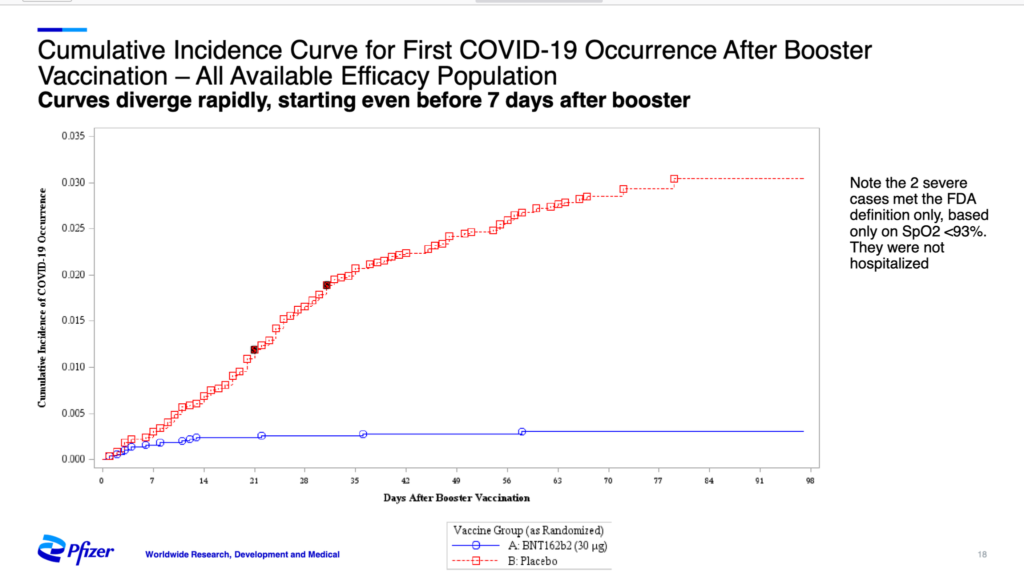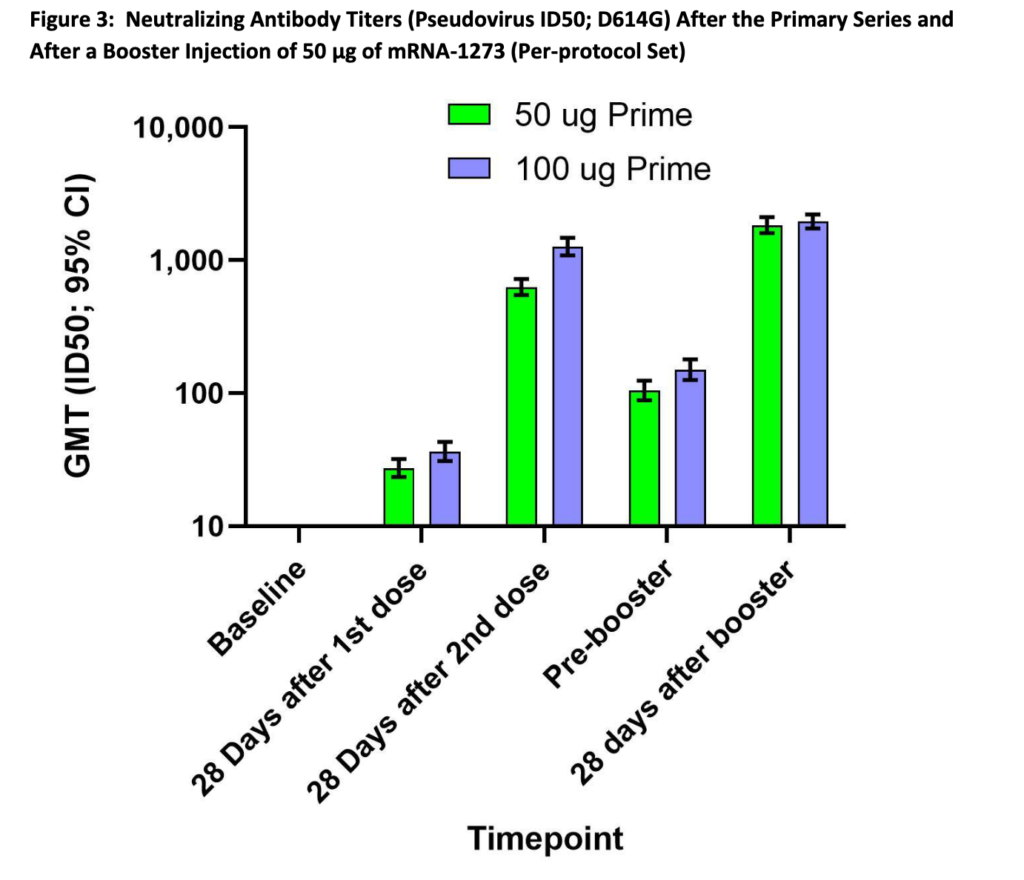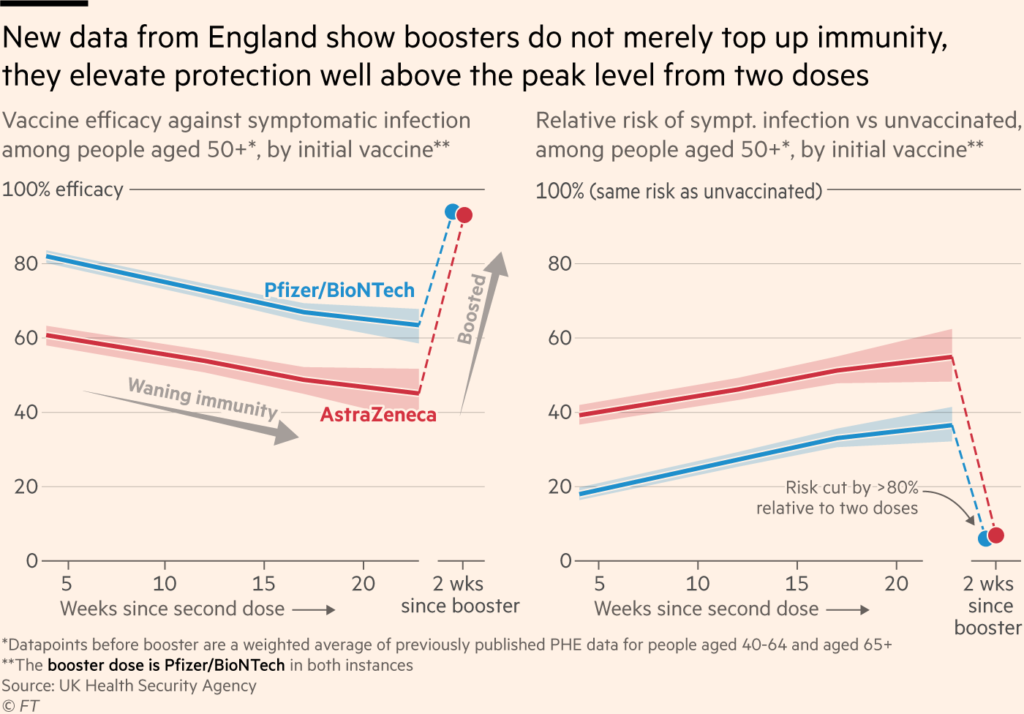Q: Boosters are now available in the U.S. for everyone aged 18+. Do I really need a COVID booster dose if I am young and healthy?
A: 🎱 Signs point to yes.
TL;DR: New evidence suggest 3rd doses boost protection beyond levels of the original 2 doses, even in healthy younger people.
COVID-19 vaccine development has been an amazing example of science in action. What’s special is that we rarely have a such a front row seat to the action.
Science is all about discovery, iterating, learning and adapting. The urgency of the pandemic has meant that much of this science is playing out in real time before our eyes on the news and social media.
When universal boosters were first suggested in late summer, there was admittedly some healthy skepticism from some in the scientific community about the need for this, some Nerdy Girls included. Protection against hospitalization and death seemed to be holding up well, and de-fanging COVID-19 the disease was the whole point, right?
But as time goes by, we accumulate more evidence. And as scientists, we update our hypotheses based on new data, even if the data are not what we expected. That evidence is starting to point strongly in the direction of 3rd doses being beneficial for most people.

❓Why didn’t we know this earlier?
Priority #1 of the vaccine trials was to establish SAFETY and EFFICACY. This was hugely successful and allowed roll-out of vaccines much sooner than many dreamed, and has already saved MILLIONS of lives. There were many secondary questions that are important in the long run, but not so important that they should have slowed down the trials by months or years. Such questions include optimal dosing, the optimal interval between doses (the first goal was crossing the bar of protection in the least amount of time), and whether the optimal primary series is 3+ rather than 2 shots.
Since SARS-CoV-2 is a novel human pathogen, there is no substitute for time passing to answer many of the key scientific questions. Now that enough time has passed since both 2nd and 3rd doses, we have mounting data that is slowly tipping the balance of evidence in favor of the value of 3rd doses for everyone.
‼️SHOW ME THE DATA‼️
💥 We think Pfizer’s recent booster trial results are downright astonishing:
For their booster trial, Pfizer enrolled 10,000 participants from their original trial who had received the primary two-dose series. Half were given a 3rd Pfizer dose *at least* 6 months after their 2nd dose (many were 8-12 months post 2nd dose), and half were given a placebo shot. Neither the participant nor the people administering the shot knew which shot was being given (“double-blinded”).
This group was followed up for up to 2 months after the booster dose, and the differences were REMARKABLE. Out of 129 confirmed symptomatic COVID-19 cases 123 were in the placebo group, compared to 6 in the vaccine group. This comes out to a relative vaccine efficacy (VE) of 95.3%. The results were consistent across both younger and older participants.
LET ME REPEAT: Those randomized to a 3rd dose had 95.3% fewer COVID-19 infections 💥COMPARED TO THOSE WITH 2 DOSES💥
Remember that even with potential “waning” immunity, two doses of the vaccine still provide a high level of protection against symptomatic infection, and even higher against hospitalization and death. So, the fact that the 3rd dose provides so much additional protection ON TOP of this is downright amazing. (See the beautiful figure from the trial below).

This is a strong indication that these vaccines may indeed be best as a 3 dose primary series, like many other vaccines such as Hepatitis B.
While we REALLY like these Pfizer results because they were from a randomized control trial and measured real infection endpoints, there is additional evidence that boosters can provide protection above and beyond what was provided by the first two doses even for young and health people.
Moderna’s booster trial has so far reported on immunogenicity data in a smaller sample of participants 18+, but has not yet reported results from their larger trial of infection endpoints similar to Pfizer’s—this should be coming.
The Moderna immunogenicity results were very promising. Those who received a 3rd dose showed almost 2X higher neutralizing antibody responses to the original variant (D614G) compared to after the two-dose series. The 3rd dose also provided a 17-fold rise from pre-booster antibody titers for the Delta variant. (See figure).

Finally, in an observational (not randomized trial) study from the UK of individuals ages 50+, boosters also seemed to elevate protection ABOVE what was originally seen for the two-dose vaccines. This was especially true for the Astrazeneca vaccine which provided lower initial protection against infection, but was also true for those who received the Pfizer vaccine. (See tweet thread and figure from the Financial Times).

Taken together, these studies provide growing evidence that even in healthy adults, a “booster” might not just restore us to the protection levels of the previous 2nd doses prior to waning, but take us to higher levels of protection than we ever had before. While boosters remain most important for older people and those most vulnerable to serious COVID-19 disease, reducing your risk of any infection can protect not only your health but help reduce spread of the virus to those around you.
These new data are slowly leading to the changing recommendations and expansion of booster recommendations for more of the population. When we look back years from now, we may even think it was silly to ever expect 2 doses given only 3 weeks apart to do the full job—the COVID-19 pandemic will definitely be the pinnacle of “hindsight was 20/20.”
The road may be bumpy, but we are testing and learning just as science should, and making adjustments as needed. Boosters-ahem-3rd doses are just one of those adjustments.
Will we need regular boosters? Many scientists are optimistic that this 3rd dose may lead to more lasting protection. But only time will tell.
What about kids? We dove into this yesterday, and are guessing that 3rd doses will eventually be extended to <18s.
⬇️ BOTTOM LINE:
3rd doses appear to boost protection against symptomatic infection substantially, regardless of age.
This protection appears even stronger than the maximum levels achieved by 2 doses.
❄️ WINTER IS COMING. SCIENCE IS AMAZING.
If you are eligible, we recommend getting your booster shot.
Love,
Those Nerdy Girls
Moderna booster immunogenicity data
Pfizer booster immunogenicity data
Full ACIP recommendation slides


